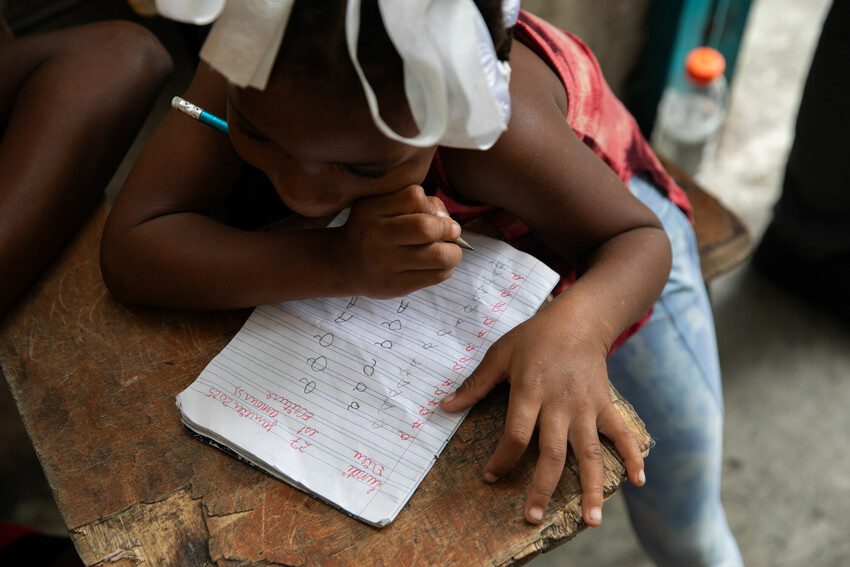Haiti displacement soars as children face education collapse and violence
20 June 2025Urgent action and inclusive solutions are needed amidst deepening displacement crises in Haiti.
As the world marks World Refugee Day, Haiti confronts a deepening humanitarian emergency with over 1.3 million people internally displaced—including 700,000 children—according to latest International Organization for Migration (IOM) figures.
Earlier this year, Plan International shared the findings of a needs assessment carried out in Haiti’s South and South-East departments, where more than 260,000 people displaced by armed violence—mainly from Port-au-Prince—have sought refuge. The assessment exposed serious violations of children’s rights, including widespread sexual violence, the collapse of the education system, and growing risks of child exploitation and trafficking. Based on surveys, focus groups and interviews with over 200 internally displaced people, the findings revealed that more than 90% of children have been denied their fundamental right to education due to the prevailing violence and insecurity.

Dire conditions for displaced families
“The families continue to flee their home and their community some of them have been forced to flee multiple times, facing extremely precarious conditions. Children are the most affected, with limited access to essential services and increasing exposure to risks of violence and exploitation. We have seen that displaced girls are especially vulnerable to sexual abuse and harassment” said Prospery Raymond, Country Director of Plan International Haiti.
According to the UN Office for the Coordination of Humanitarian Affairs (OCHA), as of April 30, 2025, nearly 1,600 schools across 4 departments in Haiti — North, West, Centre, and Artibonite — remained closed due to ongoing insecurity, with an additional 166 schools forced to relocate in search of safer learning environments. This marks a sharp increase since January, with 647 more schools shutting their doors and over 80,000 additional students and 3,000 teachers affected in just 3 months.
Urgent call to action and Plan International’sresponse to the crisis
With only 8.3% of the 2025 humanitarian response plan funded—and as the Atlantic enters a particularly active hurricane season—the situation in Haiti remains deeply concerning. Since 2022, Plan International has been actively responding to the ongoing crisis, prioritizing child protection and emergency support for displaced families. Our current efforts focus on camps for internally displaced persons in the Port-au-Prince metropolitan area and in Artibonite, where violence continues to escalate. We are also supporting families fleeing insecurity, as well as host communities, in areas such as Jacmel, Jérémie, and Anse-à-Pitres.
Our key interventions focus on providing immediate support to vulnerable communities, including the establishment of safe spaces for children, and the distribution of hygiene kits and menstrual health supplies for adolescent girls and young women. Providing counselling and referrals to survivors of violence, especially sexual violence, and support services for unaccompanied children, including helping them reunite with their families.
Additionally, we are providing cash assistance to vulnerable households to help meet their basic needs, especially purchasing food. During emergencies, access to income and essential goods is often disrupted, leaving families struggling to afford necessities.
“On World Refugee Day, we join the global call to protect the rights of displaced people and ensure their inclusion and access to lasting solutions,” emphasized Raymond. “Providing girls with safe, quality education is not only a fundamental right — it is one of the most powerful tools to build inclusive, resilient and peaceful communities, especially for those forced to flee.”


